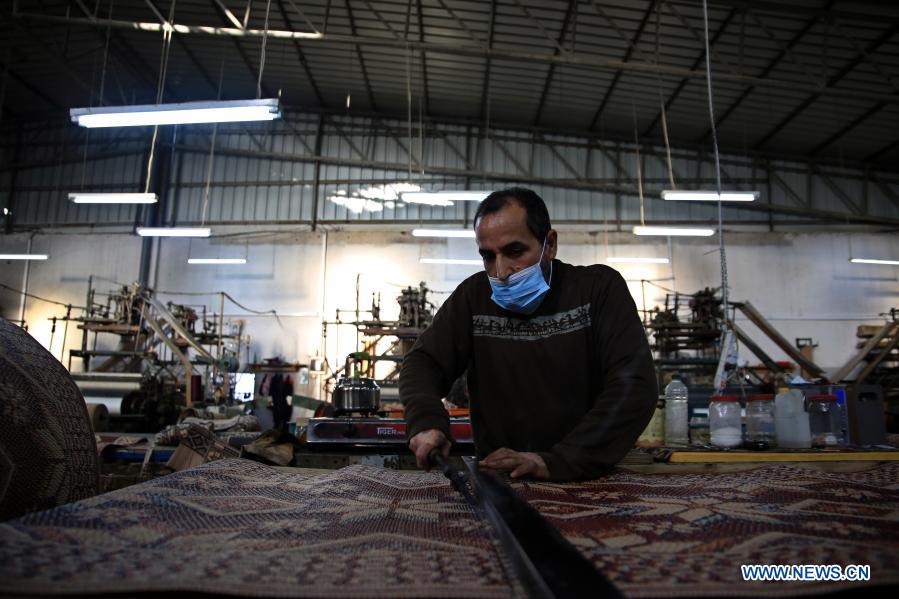
A Palestinian worker makes mats inside a mat factory in Jablaia refugee camp in the northern Gaza Strip, Feb. 3, 2021. (Photo by Rizek Abdeljawad/Xinhua)
by Sanaa Kamal
GAZA, Feb. 18 (Xinhua) -- For eight hours a day, seven Palestinians are busy in a small factory in Khan Younis city in the southern Gaza Strip, sorting, cleaning and mashing large quantities of plastic waste before the waste is recycled into other useful things by local manufacturers.
Wearing medical facemasks and gloves, they sorted the plastic waste according to its type, thickness and colors.
Maamoun Islayeh, owner of the factory, said he started this factory in 2006 after failing to secure any other sources of income.
"I had to resort to this solution to keep myself afloat," the 35-year-old father of three sons told Xinhua.
The poverty rates in the besieged Gaza Strip have seen a significant spike since the outbreak of the COVID-19 pandemic in March 2020. As a matter of fact, poverty has long pushed many Gazans to scavenge in garbage containers for plastic, metal, and aluminum in a bid to earn some money.
But now money is not what Islayeh is after only as his goal has evolved over time.
"In the beginning, my goal was to gain some money. Later ... when I started to know how badly such inorganic waste and its radiation could damage our environment, I wanted to do my utmost to help my community," he told Xinhua.
The Gaza Strip is plagued by a deteriorating waste problem. According to a 2018 report by the Palestinian Central Bureau of Statistics, the average household waste per day in Gaza stands at 716 tonnes about 12 percent of the waste is plastic.
Local authorities tackle the waste by either burning it or throwing it into the sea, both of which are considered hazardous for the environment.
And this is exactly what Islayeh and his workers try to help improve on.
"My workers and I are providing significant help to the environment by cleaning hazardousness from the plastic waste that harms human health. I buy at least 10 tonnes of plastic waste every week," Islayeh said.
Earning 15 U.S. dollars a day to keep his family afloat, Ahmed Abu Tair, a 53-year-old worker at Islayeh's factory, told Xinhua that he feels happy when he helps protect the environment from the inorganic waste that would cause health problems.
In fact, there are 20 or so other factories in Gaza like Isleyeh's that follow the same process in handling plastic waste, as more than 75 factories in the coastal enclave need mashed plastic in their production lines of chairs, toys, water hoses, mats and others, according to the Hamas-run Economy Ministry.
Falah Ouda, owner of a mat factory located in Jabalia refugee camp in the northern Gaza Strip, said 85 percent of his factory production lines rely on mashed plastic waste that he buys from Islayeh and other merchants.
"I buy one kg of the plastic waste for 0.75 dollars. But if I want to buy the plastic raw materials, I have to pay 2.5 dollars at least," said Ouda. Enditem